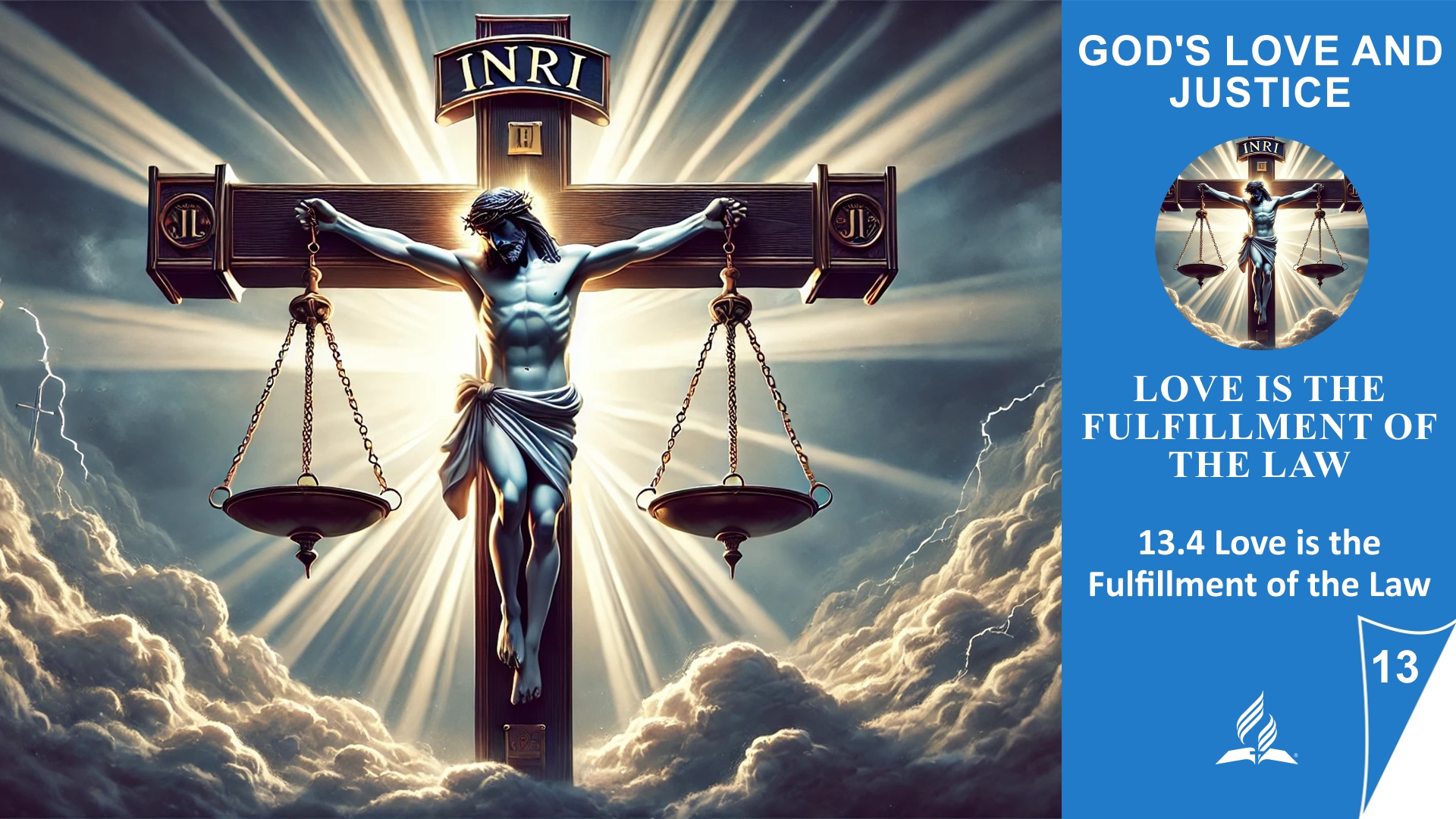


13.4 Love is the Fulfillment of the Law
Love that Acts – The Law Lived in the Heart
Read Matthew 23:23–24. What is “the most important part of the Law”? Read Deuteronomy 5:12–15 and Isaiah 58:13–14. How do these passages show the relationship between the Law (especially the Sabbath commandment) and God’s concern for justice and liberation?
The deepest dimension of God’s Law is not legal obedience in the narrow sense, but love—love that is lived out. This love is not mere emotion; it is demonstrated concretely in our actions—in daily life, in our decisions, and in how we interact with others. Paul makes this unmistakably clear in Romans 13:8–10: “Whoever loves others has fulfilled the Law.”
This love sums up the commandments because it is the goal toward which they all point: meeting our fellow human beings with the same care, respect, and mercy we would want for ourselves. Galatians 5:14 confirms this: “For the entire Law is fulfilled in keeping this one command: ‘Love your neighbor as yourself.’”
But what kind of love truly fulfills the Law?
Jesus himself gives us a clear answer in Matthew 23:23: justice, mercy, and faith—these are “the more important matters of the Law.” It’s not just about formally keeping the Law but about living the spirit of the Law. Wherever these qualities are lacking, the Law is merely a shell without a heart.
The Sabbath—often considered “only” a ceremonial commandment—is linked in Deuteronomy 5 and Isaiah 58 with social, liberating, and just actions:
-
Deuteronomy 5 reminds us of Israel’s liberation from Egypt. The Sabbath thus becomes a sign of divine deliverance—not only for Israel but for everyone living in bondage.
-
Isaiah 58 connects Sabbath observance with a call to social justice: feeding the hungry, sheltering the homeless, breaking the yoke of oppression.
These passages make it clear that anyone who truly understands the Sabbath will also stand for freedom, justice, and mercy. Love that fulfills the Law is active, tangible, and compassionate. It is not only reflected in what we refrain from doing (not committing sin) but also—and perhaps even more so—in what we do: doing good whenever it lies within our power.
Conclusion:
God’s Law is not merely a standard for what we should refrain from doing; it is a call to a way of life characterized by love, compassion, and engagement. It’s not just about not lying or not stealing—it’s about promoting truth, sharing, helping, and healing.
Whoever loves fulfills the Law—because they live as God loves.
The connection between the topic “Love Is the Fulfillment of the Law” and our everyday life and faith is profound and highly relevant. For what Paul, Jesus, and the prophets say is not something abstract—it concerns our daily decisions, our attitude, and our relationships.
-
Love in Everyday Life – Living the Law Practically
In everyday life, we encounter countless situations that reveal whether we fulfill the Law out of love:
-
When we forgive instead of holding grudges—we practice mercy.
-
When we act honestly and transparently, even at our own disadvantage—we live out truth.
-
When we take time for others, listen, help, and support—we practice neighborly love.
-
When we intentionally observe the Sabbath, not just as a day of rest but as a day of joy, justice, and community—we honor God’s will.
Every commandment can become an opportunity for love—not out of compulsion, but because God’s Spirit enables us to do so.
-
Faith That Becomes Visible
Our faith in Jesus Christ is not just an inner conviction—it becomes visible through acts of love:
“Faith works through love” (Galatians 5:6).
This means that faith which does not become visible through love is incomplete. It is not enough to think theologically correct thoughts—we should act as Christ did. The Law is not only “observed” but lived out because it has been written in our hearts (Jeremiah 31:33).
-
The Sabbath – A Day of Lived Love
The Sabbath, too, becomes a mirror of our everyday faith:
-
How do we spend it?
-
Is it merely a day of rest for ourselves?
-
Or does it become a day in which we strengthen family bonds, serve others, do good, and connect with God?
In Isaiah 58, God shows that true Sabbath observance is intertwined with justice, sharing, and compassion. Thus, the Sabbath becomes a training ground for our entire lives.
✨ Conclusion for Our Everyday Life and Faith:
-
Love is the standard. It’s not just the letter of the Law; love determines how we should act.
-
The Law gives direction. It helps us recognize what love looks like in practical terms—through honesty, faithfulness, compassion, and justice.
-
Faith motivates us. We do good not to please God, but because we are accepted by Him.
-
Everyday life becomes a place of worship. Every moment in which we act out of love honors God and makes our faith visible.
“For love does no harm to a neighbor. Therefore love is the fulfillment of the Law.” (Romans 13:10)
May our lives be a reflection of this love—every day.

True love is shown not only in what we refrain from doing but in what we do out of love.
(Visited 28 times, 1 visits today)





















